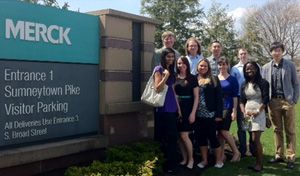Curriculum
Program of Study
The Master of Science in Drug Discovery & Development (DDD) program offers a flexible curriculum highlighted by a core set of required courses that introduce students to the essential scientific underpinnings of the field, key technical aspects, the various disciplines and the different organizational structures. Students gain comprehensive knowledge of pharmacology, physiology, pharmacoepidemiology, translational medicine, clinical resarch, regulatory affairs and pharmacogenomics. Working in project teams, students get practical experience implementing strategies.
Students have the opportunity to customize their program with a broad range of elective courses.
Topics covered in this program include:
- The discovery process from target identification to IND submission
- The development process from first in man to commercialization
- Clinical research
- Translational medicine, translational and preclinical models
- New product development
- Case studies across therapeutic and disease areas
- Fundamentals of molecular medicine
- Pharmaceutical management
- Vaccines and vaccine development
- Pharmacology and physiology
- Intellectual property law
- Regulatory and postmarketing issues
- Entrepreneurship
Program Requirements

Both thesis and non-thesis options are available. A written thesis must be focused on an area of concentration within the pharmaceutical industry. The thesis may be based on research conducted during a pharmaceutical rotation at Drexel or at a pharmaceutical or biotechnology companies, or it may be a literature-based thesis on a topic of relevance to the program. The non-thesis option requires the preparation of a scholarly document of publication quality on a topic related to the biopharmaceutical field.
Sample Plan of Study (Full-Time or Part Time)
Please visit the Drexel University Catalog for more information.
Additional Opportunities
Certificate in Drug Discovery and Development
The Certificate in Drug Discovery and Development program provides in-depth exposure to the multiple elements involved in the discovery and development of prescription medications. This program has been designed to provide a comprehensive overview of the complex and specialized process of drug discovery and development and help students advance within the pharmaceutical and biotechnology industry. Learn more.
Program Level Outcomes
Graduates of the Master of Science in Drug Discovery & Development program will achieve six program level outcomes that describe the skills, competencies and knowledge gained through completion of the program curriculum.
- Demonstrate a working knowledge of the drug discovery and development process and an understanding of the fundamental scientific principles that guide the development of novel therapeutics
- Recognize the role and evaluate the contributions of representatives of different disciplines, organizational functions and agencies involved in advancing a candidate molecule from the laboratory to the market
- Demonstrate a working knowledge of the fundamental principles of pharmacology and a familiarity with the mechanism of action of commonly used drugs
- Evaluate the properties of a candidate molecule and assess its therapeutic potential, identify key strengths and weaknesses and recommend remedies to overcome limitations
- Demonstrate sound ethical principles and values and the ability to work independently or in diverse groups to complete tasks or assignments
- Synthesize information from multiple and diverse sources and identify the most fruitful plan of action
- Demonstrate the ability to communicate technical information clearly and effectively in both written and oral form to scientific and non-scientific audiences